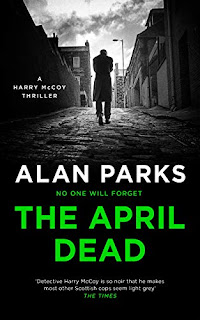The April Dead – Alan Parks
We’re in April 1974 in this latest book in the series. A man has been killed in an explosion in a small flat in an unlikely part of the city to be targeted by bombers. An IRA campaign has however already targeted London, Manchester and Birmingham, and the gruesome remains at the scene do make it look like the guy was making a homemade bomb when it went off. It’s a scene that is a bit much for McCoy’s delicate stomach and his latest diagnosis of peptic ulcer to take, so he is happy to pass this latest development over to Special Branch to look into further. He has other things to worry about, but this one is clearly not going away anytime soon.
Chief among McCoy concerns is keeping a lid on the ever present and escalating gang violence in the city, and that means keeping his childhood friend Stevie Cooper on a leash. That’s a tall order, but he hopes he can keep the latest feud at bay even for a little while after Stevie gets out of his latest spell in prison. It doesn’t quite work out that way of course. He doesn’t need the additional problem of a missing person investigation, but retired US Navy captain Andrew Stewart is very persuasive and concerned about his son Donny, who has been missing off the US naval base a few days now. A quiet boy, it’s not like him to wander off, and not a good time for it either with further bombs going off in the city. Another thing that clearly isn’t going away either.
That is something you get a strong sense of here in The April Dead; the relentless nature of crime and the fight against crime, the way it slips into everything, and in somewhere like Glasgow that can mean some uncomfortable places. The divisions in the city during this period have already been noted in previous books – the class divide, the haves and have-nots, the sectarian divide – and they all go deep, so deep that even the traditional opportunities for escape in music, football and boxing all end up embroiled in the same problems, whether it’s the drugs or gangs or religion. That often means picking a side – if you even have a choice – and for McCoy – a police detective with a friend who is at the head of one of the criminal gangs in the city – that’s a tricky one.
That much we’ve seen already, but The April Dead seems to go further, expanding Parks’ view of the 70s as more or less the birth of the modern age. There are clear links here that suggest that crime in the present day and even terrorism on British soil is influenced by the social changes of 50 years ago, and there are even perhaps remnants of a dark past that go back further and deeper than that. From historical child abuse to colonialism and Scottish independence, the way Parks shows crime reaching into all parts of society is frightening, but the ease and conviction with which these connections are drawn is also impressive.
Which is what makes Parks’ Harry McCoy series always a terrific read. It’s not just the authenticity of its 1970s' Glasgow crime setting, but how the author manages to tap into the period’s underlying values and lack of values. On one level it’s simple enough but there are deeper undercurrents that run through it that highlight McCoy’s dilemma, and the difficult choices he has to make aren’t getting any easier. I’m amazed that Parks hasn’t received greater recognition for his Harry McCoy series up to now, but in The April Dead it takes a leap to a new level. If you haven’t read Parks yet this isn’t a bad place to start, but any of the books should be enough to convince you that there is a thrilling, groundbreaking series in the making here.




Comments
Post a Comment